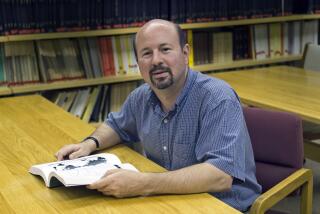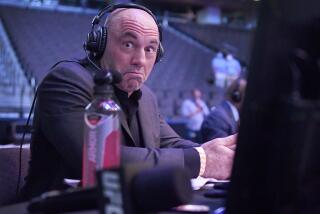The Cutting Edge: COMPUTING / TECHNOLOGY / INNOVATION : Proof Is in the Pudding--Chocolate Pudding
- Share via
Despite my addiction to juicy steaks, I all but gave up eating red meat several years ago because of mounting evidence that a nice T-bone right off the barbecue would increase my chances of heart disease.
Then along comes a study that says red meat might actually lower the risk of heart attack because it raises the level of so-called “good cholesterol,” which offsets the bad stuff that is trying to clog my arteries. The scientists who made that announcement said even a little chocolate might help, bless their souls.
Wait a minute. What’s going on here? Isn’t anybody in charge?
Nope.
It’s little wonder that some people are losing faith in what science tells them. How many times has someone advised you to ignore warnings against some perceived hazard because in a few days someone else will prove it is good for you?
But nobody is proving anything, because in science there is no such thing as proof, aside from the pure science of mathematics. Yet faced with chronic funding problems, and eager to make their mark on the world, some scientists are quick to announce their findings as though they are uttering the final word.
Now I’m told I should have a glass of red wine with my red meat. But I have to balance that advice against words once uttered by a friend, talking about his alcoholic father: “Dad used to ask, ‘What the hell good is one drink?’ ”
Scientists now face a credibility problem they’ve in part brought on themselves for sometimes making premature elucidations, and in part by the fact that they’ve been so successful in gaining the attention of the public.
When I first started covering science, only a handful of newspapers across the country had full-time science writers. Today, nearly every large newspaper has at least one, and many papers, including this one, have several specialists who cover science, technology and medicine. The television networks, and even many local stations, also have reporters who specialize in science.
So we are constantly bombarded with new findings that challenge what we have just come to believe.
But so are scientists, and they frequently are as befuddled as the rest of us. So they embrace the argument that is most likely to be true, and that conviction can be very strong if the evidence is overwhelming.
“We come to things with the full strength of our convictions,” Peter Galison of Stanford University once told me. “We come to believe them as much as we come to believe anything.
“It’s absolutely true that we can’t have absolute certainty, but nonetheless our knowledge can be made very secure.”
To stretch a point, it’s a little like the “trial of the century” now unfolding in a Los Angeles courtroom. As soon as a prosecution witness seems to have finally nailed the coffin closed on O.J. Simpson, the defense muddies the argument. And so far, we have only heard one side, the prosecution’s. The defense team will produce its own witnesses, including scientific experts who will look at the same evidence produced by the prosecution and reach opposite conclusions from those of other scientists who have testified for the state.
In the end, the jury will be asked to determine the fate of the football legend. But what they will have before them is not proof of anything. They will be asked simply if the evidence is sufficient to convict, and if there is no reasonable doubt that the accused is guilty.
We can ask no more than that of science.
“Typically, proof in science is a matter of relative competition between two or more theories in which you are really saying Theory A does better than its competitors and therefore I’m going to accept Theory A, at least for the time being,” James Woodward, Caltech’s philosopher of science, told me.
“But then someone may come along and introduce some possibility that hadn’t even occurred to you, and you have to start all over again.”
That uncertainty goes against human instincts.
“It’s hard for human beings to maintain a sort of intermediate state between belief and disbelief in which you just suspend judgment,” says Woodward. “We tend to gravitate to one of two possibilities and say, ‘No way, that can’t possibly be right,’ or else we say, ‘Yeah, that is right.’
“I think human beings are sort of built that way.”
*
However, this problem will get tougher, not easier, as time goes on. Some of the great issues of today, such as global warming and depletion of the ozone layer, are so complex that the level of uncertainty is immense. Yet policy makers are being forced to make decisions today because if they wait until all the evidence is in, it may be too late.
As we gain a greater understanding of the planet on which we live, our questions will grow more complicated, and our solutions more difficult. Scientists who know their work is incomplete will be asked to point the way, and political leaders faced with asking their people to make great sacrifices will long for simpler times.
But the good old days won’t be back.
*
Lee Dye can be reached by e-mail at 72040.3515@compuserve.com.






